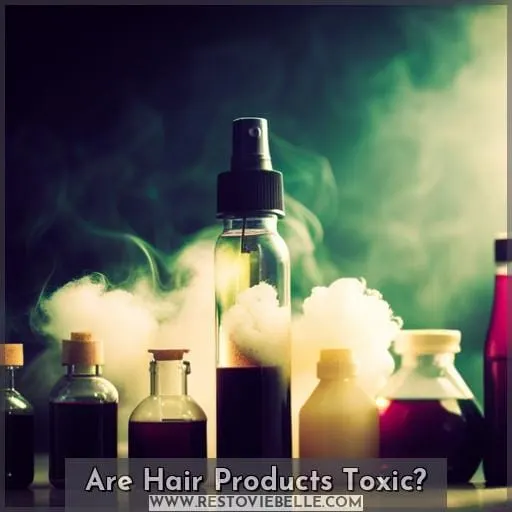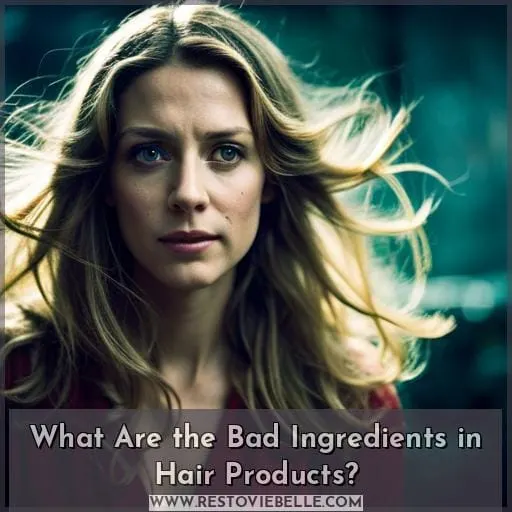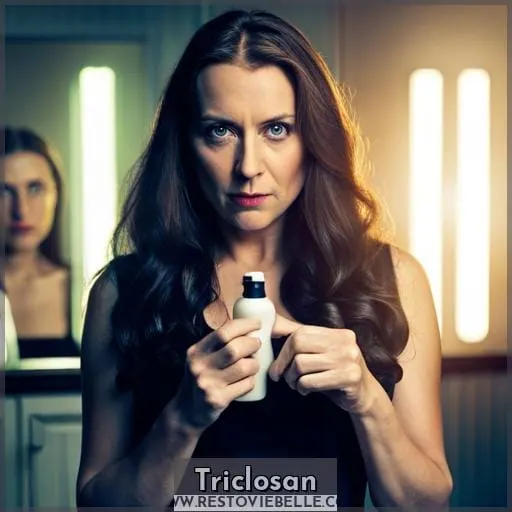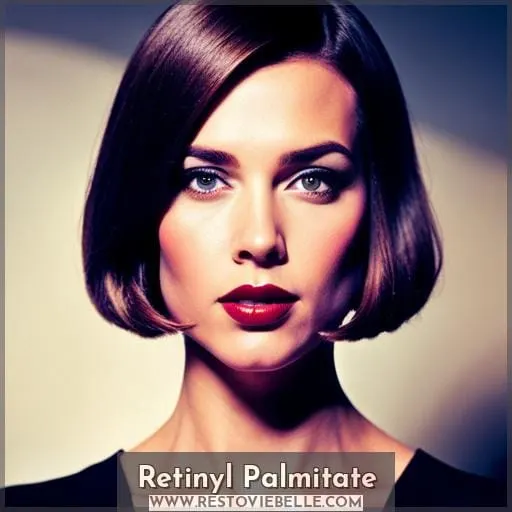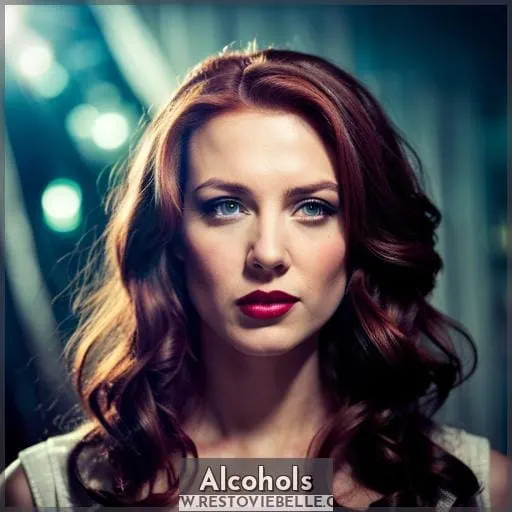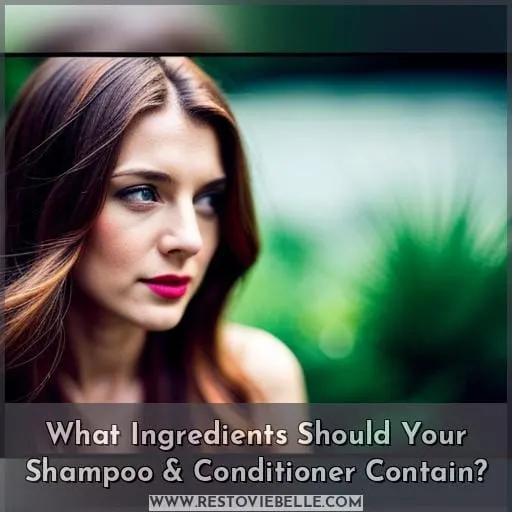This site is supported by our readers. We may earn a commission, at no cost to you, if you purchase through links.
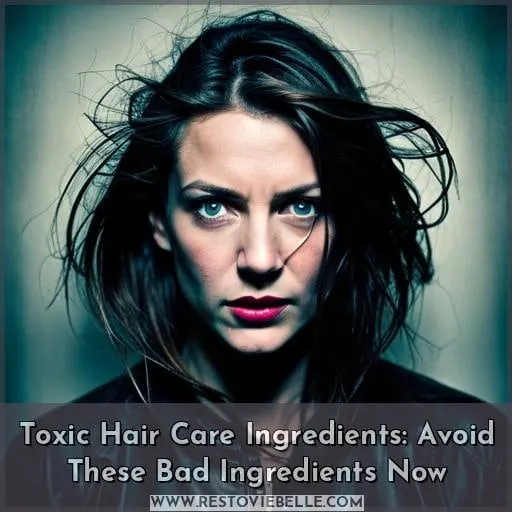 Do you know what’s really in your hair products? If not, then it’s time to arm yourself with the knowledge of toxic ingredients that are commonly found in shampoos and conditioners. From sulfates to parabens, many of these bad ingredients for hair can actually do more harm than good.
Do you know what’s really in your hair products? If not, then it’s time to arm yourself with the knowledge of toxic ingredients that are commonly found in shampoos and conditioners. From sulfates to parabens, many of these bad ingredients for hair can actually do more harm than good.
As a consumer who wants healthy and beautiful-looking locks without any side effects, learning about these common toxins is key.
Table Of Contents
- Key Takeaways
- Are Hair Products Toxic?
- What Are the Bad Ingredients in Hair Products?
- Polyethylene Glycols (PEG)
- Triclosan
- Dimethicone
- Retinyl Palmitate
- Alcohols
- What Ingredients Should Your Shampoo & Conditioner Contain?
- Parabens (propyl-, Isopropyl-, Butyl-, and Isobutyl-)
- Synthetic Colors
- Propylene Glycol
- Ethanolamines (diethanolamine [DEA], Monoethanolamine [MEA], and Triethanolamine [TEA])
- Mineral Oil and Petroleum (also Called Petrolatum, Petroleum Jelly, and Paraffin Oil)
- Sodium Lauryl Sulfate (SLS) / Sodium Laureth Sulfate (SLES)
- Frequently Asked Questions (FAQs)
- Are natural shampoos better for my hair?
- How can I tell if a hair product contains harmful ingredients?
- What are the effects of long-term use of hair products with toxic ingredients?
- Are there any safe alternatives to commercial hair products?
- What are the best ingredients to look for when selecting a hair product?
- Conclusion
Key Takeaways
- Sulfates (SLS, SLES, ammonium lauryl sulfate): Strip essential oils, cause allergies, organ toxicity.
- Parabens (propyl-, isopropyl-, butyl-, isobutyl-): Hormone disruption, age-related risks.
- Denatured alcohols (propanol, isopropyl): Dry, brittle hair, skin reactions.
- Synthetic fragrances: Skin reactions, choose fragrance-free.
Are Hair Products Toxic?
You may not be aware, but many hair products contain toxic ingredients that can have negative effects on your health in the long run. Sulfates like Sodium Lauryl Sulfate (SLS) and Ammonium Lauryl Sulfate are common surfactants found in shampoos and other haircare products.
They can strip away essential oils from your scalp. Parabens, such as Butyl, Propyl, and Ethylparaben, are used to extend the shelf life of a product, but they also disrupt hormones, leading to various problems including infertility or cancer.
Phthalates increase the spreadability of lotions or gels by improving viscosity levels. However, they act as endocrine disruptors due to their chemical structure, which is similar to estrogen. This affects reproductive organs negatively. Formaldehyde is another harmful ingredient present within certain treatments.
It releases carcinogenic formaldehyde when exposed to heat, leading to tumor development over time if you’re not careful about what type of treatment you use for your hair! Triclosan is an antimicrobial agent frequently utilized in shampoos.
However, it accumulates inside fat cells, causing hormonal imbalances. Dimethicone coats the strands, providing immediate shine. However, it irritates scalps easily, resulting in severe dryness over time. Organic-based options tend to have a lesser amount of chemicals, thus actively reducing various harms caused by synthetic compositions.
What Are the Bad Ingredients in Hair Products?
Hair products can contain many dangerous chemicals, such as sulfates, mineral oil, and parabens. Denatured alcohols, synthetic fragrances, formaldehyde, coal tar, silicones, phthalates, and para-phenylenediamine (PPD) are some of the other toxic ingredients often found in hair care products.
It is important to read labels carefully and choose more natural options whenever possible for healthier hair.
Sulfates
Be aware that sulfates, like SLS, SLES, and ammonium lauryl sulfate, are found in nearly 90% of shampoos. Allergies, endocrine disruption, and organ toxicity can result from using these products. Coconut oil or mild surfactants instead of quaternium salts provide a more natural option with less immune disruption and thyroid issues, such as selenium sulfide.
Mineral Oil
Mineral oil may add shine to your tresses, but it won’t do much in terms of treating existing damage. Product safety is an important consideration when opting for hair care products as exposure to certain chemicals can lead to unwanted effects.
Ingredient safety and cosmetic regulation should be taken into account when selecting a conditioner or shampoo, including those containing mineral oil, mango butter, or even retinyl palmitate and toluene.
Parabens
Parabens are synthetic preservatives found in many hair products, so take caution when choosing your next product – they can pose a potential health risk. Parabens’ safety is debated, and possible effects include endocrine disruption. Opt for paraben-free products that contain shea butter, argan oil, etc.
Natural alternatives minimize the dangers of parabens. Shea butter and argan oil provide hydration, while natural hair care products offer safe solutions to keep you healthy.
Denatured Alcohols
Avoid using denatured alcohols in your hair products, as they can leave your scalp dry and brittle. Safety concerns include long-term effects and skin reactions when using them. Natural alternatives are better for hair health, such as alcohol-free products or those with minimal fragrance sensitivity.
Formaldehyde safety is also essential! Hair dryness can be avoided by making smart choices and avoiding harmful ingredients in haircare regimens.
Synthetic Fragrances
Synthetic fragrances can cause skin reactions, so choose a product without them for healthier hair. Look for fragrance-free options and certified organic components in natural hair care. Vitamin E, B5, and plant-derived ingredients are great alternatives to synthetic fragrances, while silicone-free products reduce cosmetic risks.
Formaldehyde
Be aware of formaldehyde, a carcinogen that may be present in hair treatments. It is found in many products and poses serious health risks from exposure. Hair care labels should be read for possible sources; it is one of the most toxic ingredients to avoid.
Formaldehyde dangers include immune system disruption, organ toxicity, and the risk of cancer.
Coal Tar
Stay away from dyes derived from coal tar, as they can contain carcinogenic chemicals. Safety regulations have failed to protect us against the health effects and environmental impacts of coal tar in cosmetics.
Toxic chemicals, skin irritants, and mineral oil/petroleum are common in beauty products, besides sodium lauryl sulfate posing serious health concerns.
Silicones
Avoid silicones in your hair products as they can coat your locks with an unnatural gloss, like a plastic sheen that won’t wash away! Silicone allergies and buildup are real dangers to consider when looking for safe hair care ingredients.
Silicone oils damage the scalp and lead to dry, brittle strands. Nourish without silicone by opting for natural alternatives or certified-organic components such as aloe vera, coconut oil, chamomile tea extract, or olive oil instead.
Phthalates
Phthalates are endocrine disruptors that increase spreadability in hair products. Avoid phthalate-containing fragrances, dyes, and harmful ingredients for hair. Be aware of potential risks; consult regulatory bodies before use.
They can cause skin reactions, organ toxicity, and cognitive effects that may lead to cancer.
Para-Phenylenediamine (PPD)
Look out for Para-Phenylenediamine (PPD) in hair dyes – it can cause allergic reactions, immune disruption, and organ toxicity. Avoid toxic ingredients, such as carcinogenic chemicals, in personal care products.
Hair care product safety is key, so avoid endocrine disruptors and eye irritant colors.
Polyethylene Glycols (PEG)
Polyethylene Glycols (PEG) can wreak havoc on your hair, so be sure to avoid them in products. PEG-based products can cause hormone imbalance. They can also dry out the scalp and lead to breakage. Additionally, they contain harmful chemicals that irritate skin and damage hair health.
Moreover, they make it easier for other toxins like mineral oil to penetrate the hair shaft more deeply and increase potential harm caused by these ingredients.
To keep your locks healthy, opt for more natural alternatives such as sulfate-free shampoo or conditioners with nourishing oils like coconut or olive oil instead of damaging chemical agents found in many conventional formulas containing polyethylene glycols (PEG).
When looking at labels, you should always double-check what’s included — even if claims seem harmless. Some brands may sneak dangerous components into their blends, which could ultimately put your mane at risk of severe damage over time if used regularly without caution.
Triclosan
Avoid triclosan, a hormone disruptor that accumulates in fat cells. It is commonly found in hair care products and has been linked to health risks and environmental impacts due to its chemical makeup.
Those looking for non-toxic cosmetic ingredients should make sure that triclosan does not appear on the label of any product they are considering purchasing.
The beauty industry can be complex. It’s important to read labels carefully when evaluating potential purchases as many harmful hair product ingredients exist. These include sulfates, parabens, phthalates, formaldehyde releasers, dimethicone, and retinyl palmitate, just to name a few.
Additionally, one must consider the risks of ethanolamines in their products. These chemicals can cause sensitivities or even allergic reactions upon skin contact with them or inhalation from aerosolized forms present during application processes like styling spray use.
| Non-Toxic Alternatives | Toxic Ingredients | Benefits | |
|---|---|---|---|
| Natural Oils | Sulfates | Moisturizing | |
| Coconut Oil | Parabens | Strengthening | |
| Jojoba Oil | Phthalates | Conditioning | |
| Olive oil | Formaldehyde Releasers | Smoothing | |
| Dimethicone | Scalp Health |
Dimethicone
Triclosan is a hormone disruptor that can accumulate in fat cells, but it’s not the only ingredient you should avoid when choosing hair products. Dimethicone is another potential problem; this silicone-based chemical may provide short-term protection by coating the strands of your hair, but over time it can cause scalp irritation and dryness.
It also forms an impermeable barrier on your skin which prevents other ingredients from penetrating through – more than likely ones with actual beneficial benefits to support healthy hair growth.
Dimethicone often comes alongside synthetic colors derived from coal tar or petroleum, two sources linked to health issues like cancer and organ toxicity along with eye irritants such as quaternium-15 and resorcinol.
High concentrations of denatured alcohols are another component to look out for; while they may add shine at first glance they will eventually lead to brittleness due to their drying effect on the scalp’s natural oils—something you definitely don’t want!
When shopping for shampoos or conditioners, make sure propylene glycol isn’t present either since its purpose is mainly used as a preservative rather than something that actually does anything good for your locks long term wise, thus rendering it completely useless if not harmful even though some still use them given their cost effectiveness production wise.
It takes effort finding safer haircare options free of dimethicone risks and all those toxic ingredients mentioned before, so take into consideration reading labels carefully whenever possible because nowadays companies have become very skilled at making strong claims about how great their product might be without revealing what truly lies beneath.
If one opts going down the organic route, then essential oils (peppermint, lemon, lavender) plus certified organic components should be preferred instead.
Retinyl Palmitate
Retinyl Palmitate, a synthetic derivative of Vitamin A, can cause skin issues and has been linked to cancer and organ toxicity. High levels in the body can lead to endocrine disruption as well as an increased risk for certain cancers.
The potential health risks associated with retinyl palmitate are why it’s important to look out for this ingredient when choosing hair products.
- Increased Toxicity Levels: Retinyl palmitate may increase the overall toxicity levels of a product if used in high concentrations or over extended periods of time.
- Endocrine Disruption: This chemical could potentially disrupt hormones like estrogen and testosterone due to its ability to produce free radicals, which damage cells at a molecular level.
- Organ Toxicity: Long-term exposure could also increase one’s chances of developing liver or kidney problems since retinol palmitate is not easily eliminated from the body after use.
- Immune System Damage: As with any other toxin, prolonged usage could have negative impacts on one’s immune system, including allergies, asthma, eczema, etc.
The presence of retinyl palmitate should certainly be taken into account when selecting hair care products – especially those specifically formulated for children. In addition, pregnant women should pay special attention during their selection process given that there are higher risks associated with exposing unborn babies directly through topical applications.
It’s essential that consumers read labels carefully before purchasing cosmetics so they know exactly what chemicals they’re introducing into their bodies, which might otherwise go unnoticed until serious health consequences arise later on down the line.
Alcohols
Beware of alcohols like propanol and isopropyl, which can strip hair of moisture – a stitch in time saves nine. These are common ingredients found in many commercial products, but should be avoided as they cause more harm than good to your precious locks.
Overusing them will lead to dryness and brittleness that’s difficult to repair. To protect your tresses from the damage caused by alcohols, look for natural alternatives such as coconut oil or olive oil.
Additionally, opting for sulfate-free shampoos with mild surfactants can help keep hair healthy without compromising on quality cleansing power. Humectant ingredients like mango butter or shea butter also work wonders when it comes to avoiding alcohols while still providing hydration benefits for damaged hair fibers.
Vitamins E & B5 further protect against environmental aggressors, while argan oil conditions and strengthens over time – all safe alternatives if you’re looking at protecting your mane! Make sure you read shampoo labels carefully before investing in any product so that you know exactly what’s going into keeping those luscious locks strong & beautiful!
What Ingredients Should Your Shampoo & Conditioner Contain?
You should be aware of the potentially damaging ingredients in hair products, such as parabens (propyl-, isopropyl-, butyl-, and isobutyl-), synthetic colors, propylene glycol, ethanolamines (diethanolamine [DEA], monoethanolamine [MEA], and triethanolamine [TEA]), mineral oil or petroleum (also called petrolatum, petroleum jelly, or paraffin oil), and sodium lauryl sulfate/sodium laureth sulfate.
These can all have a negative impact on your hair health if used regularly. Therefore, it is important to carefully consider what you put into your shampoo and conditioner when choosing which one to purchase.
Parabens (propyl-, Isopropyl-, Butyl-, and Isobutyl-)
Be aware that parabens, such as propyl-, isopropyl-, butyl-, and isobutyl-, can extend the shelf life of certain products but are potentially linked to endocrine disruption. Age-related risks, potential dangers to health, and environmental concerns should be considered when selecting a product containing parabens.
- Alternative ingredients with similar benefits;
- Product selection based on research;
- Awareness of possible side effects from usage. When choosing hair care products, it is important to understand their long-term effect before investing in them for better protection against these age-related risks!
Synthetic Colors
Synthetic colors, derived from coal tar and petroleum, can be a real pain in the neck for your hair health. Avoid toluene, resorcinol, and selenium sulfide-containing fragrances, as well as quaternium 15.
Propylene Glycol
Avoid using Propylene Glycol in your shampoo and conditioner, as it can cause skin irritation. Opt for fragrance-free, plant-based options with no artificial color or toxic chemicals to ensure a healthier hair routine.
Look for certified organic components such as aloe vera, coconut oil, and essential oils like peppermint, lemon, and lavender.
Ethanolamines (diethanolamine [DEA], Monoethanolamine [MEA], and Triethanolamine [TEA])
It is important to know that ethanolamines like diethanolamine (DEA), monoethanolamine (MEA), and triethanolamine (TEA) are often used in hair products, but these chemicals can be potentially dangerous.
The toxicity of DEA, the effects of MEA, and the safety of TEA should not be taken lightly as they can cause skin irritation or scalp damage. For healthy hair care, avoid using any product containing these ingredients to prevent potential health risks.
Mineral Oil and Petroleum (also Called Petrolatum, Petroleum Jelly, and Paraffin Oil)
Be aware of mineral oil and petroleum, also known as petrolatum, petroleum jelly, or paraffin oil. They can coat your hair like a suit of armor but leave it feeling stiff and lifeless in the long run. Drying effects, scalp irritation, associated risks with skin allergies, and endocrine disruption are all reasons to avoid these ingredients when shopping for shampoos and conditioners.
Sodium Lauryl Sulfate (SLS) / Sodium Laureth Sulfate (SLES)
Sodium Lauryl Sulfate (SLS) and Sodium Laureth Sulfate (SLES) are surfactants that may cause dryness, irritation, and damage to your hair. Studies have found links between their use in cosmetics and toxicity concerns such as carcinogenic effects, endocrine disruption, and organ toxicity.
They can strip the scalp of its natural oils, leading to breakage or frizzy strands. Avoid these ingredients for healthier hair; opt for sulfate-free mild cleansers with humectants like coconut oil instead.
Frequently Asked Questions (FAQs)
Are natural shampoos better for my hair?
Yes! Natural shampoos are great for your hair. They’re free from harsh chemicals, help retain moisture, and protect the scalp from irritation. Plus, they come in a range of scents and textures that make them enjoyable to use.
How can I tell if a hair product contains harmful ingredients?
Read labels carefully and look for sulfates, parabens, phthalates, formaldehyde, and other ingredients that can damage your hair.
What are the effects of long-term use of hair products with toxic ingredients?
Long-term use of hair products with toxic ingredients can cause damage to your scalp and hair, leading to dryness, brittleness, and irritation. These chemicals slowly break down the strength of your locks over time, threatening freedom from self-expression.
Are there any safe alternatives to commercial hair products?
Yes! There are safe alternatives to commercial hair care products, such as natural shampoos and conditioners with ingredients like essential oils, aloe vera, and coconut oil. These provide the same benefits without exposing you to toxic chemicals that can cause long-term damage.
Make sure to read labels carefully when selecting which product is best for your hair type and needs.
What are the best ingredients to look for when selecting a hair product?
Look for natural, sulfate-free ingredients such as essential oils, coconut oil, and plant-based butters to nourish your hair. Avoid chemicals like parabens and phthalates that can be damaging or disrupt the endocrine system.
Conclusion
You may think that hair products are safe, but they’re actually full of harmful ingredients like sulfates, mineral oil, parabens, denatured alcohols, synthetic fragrances, formaldehyde, coal tar, silicones, phthalates, PPD, PEG, triclosan, dimethicone, retinyl palmitate, and alcohols.
To keep your hair healthy and strong, you need to choose the right products carefully, avoiding dangerous ingredients like those mentioned above. Look for shampoos and conditioners made with natural, plant-based ingredients, such as essential oils, aloe, coconut oil, chamomile, olive, and other plant oils.
By selecting the right hair care products, you can have healthier hair and avoid the damaging side effects of bad ingredients for hair.
